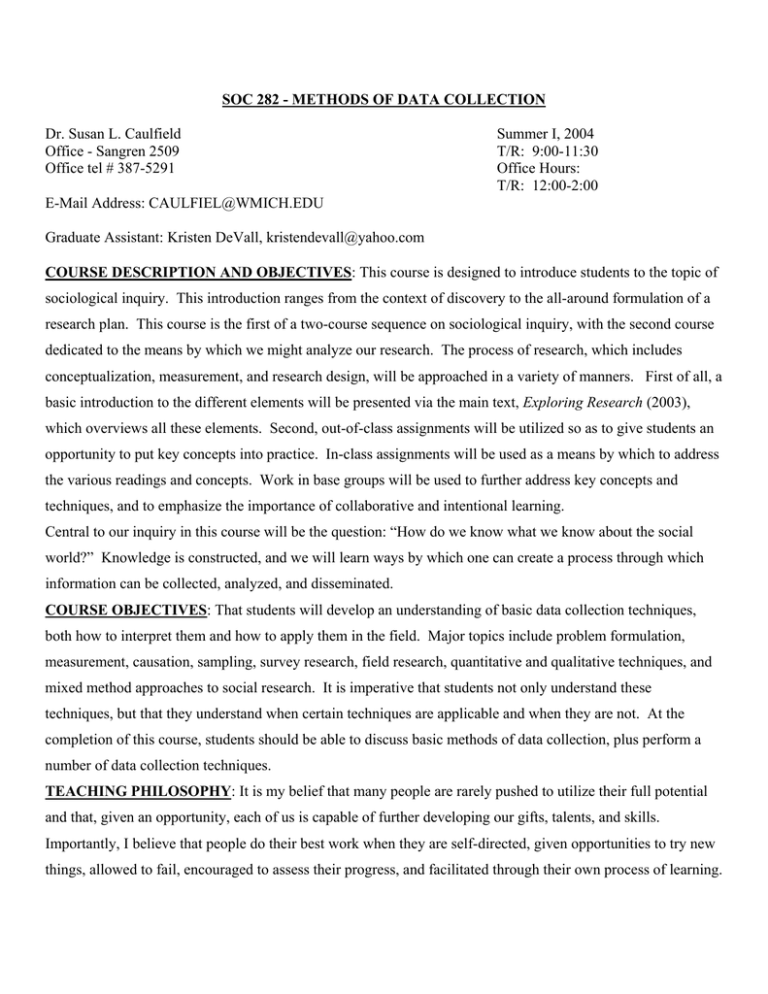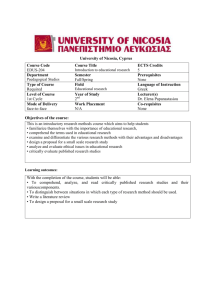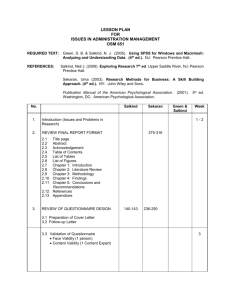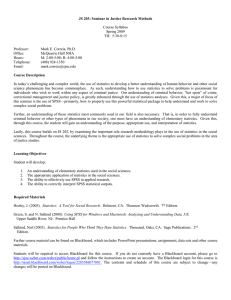SOC 282 - METHODS OF DATA COLLECTION Dr. Susan
advertisement

SOC 282 - METHODS OF DATA COLLECTION Dr. Susan L. Caulfield Office - Sangren 2509 Office tel # 387-5291 Summer I, 2004 T/R: 9:00-11:30 Office Hours: T/R: 12:00-2:00 E-Mail Address: CAULFIEL@WMICH.EDU Graduate Assistant: Kristen DeVall, kristendevall@yahoo.com COURSE DESCRIPTION AND OBJECTIVES: This course is designed to introduce students to the topic of sociological inquiry. This introduction ranges from the context of discovery to the all-around formulation of a research plan. This course is the first of a two-course sequence on sociological inquiry, with the second course dedicated to the means by which we might analyze our research. The process of research, which includes conceptualization, measurement, and research design, will be approached in a variety of manners. First of all, a basic introduction to the different elements will be presented via the main text, Exploring Research (2003), which overviews all these elements. Second, out-of-class assignments will be utilized so as to give students an opportunity to put key concepts into practice. In-class assignments will be used as a means by which to address the various readings and concepts. Work in base groups will be used to further address key concepts and techniques, and to emphasize the importance of collaborative and intentional learning. Central to our inquiry in this course will be the question: “How do we know what we know about the social world?” Knowledge is constructed, and we will learn ways by which one can create a process through which information can be collected, analyzed, and disseminated. COURSE OBJECTIVES: That students will develop an understanding of basic data collection techniques, both how to interpret them and how to apply them in the field. Major topics include problem formulation, measurement, causation, sampling, survey research, field research, quantitative and qualitative techniques, and mixed method approaches to social research. It is imperative that students not only understand these techniques, but that they understand when certain techniques are applicable and when they are not. At the completion of this course, students should be able to discuss basic methods of data collection, plus perform a number of data collection techniques. TEACHING PHILOSOPHY: It is my belief that many people are rarely pushed to utilize their full potential and that, given an opportunity, each of us is capable of further developing our gifts, talents, and skills. Importantly, I believe that people do their best work when they are self-directed, given opportunities to try new things, allowed to fail, encouraged to assess their progress, and facilitated through their own process of learning. I also believe that working in groups is important and in two key ways. First, working in groups is something most of us will do throughout our lives, whether it is in the workplace or the home. Practicing effective ways to work in groups is, then, relevant to all of our lives. Second, working in groups allows each of us to benefit from the gifts and talents of others. None of us is a perfect being and few of us are equipped with all the skills needed in every domain of our lives. Therefore, working with others enriches the learning experience for each and every one of us. I approach learning as something done best when individuals are given opportunities to solve problems and to develop their critical thinking skills. This means at times that some students will feel as though they are flailing about and unsure of what they are doing. It is at these times that students must trust that continued effort will bring desired results. I believe that learning is less about the final product (i.e., grade or amount of new information) as it is about the process of discovering ways in which we learn, ways in which we can improve, and ways in which we can make contributions to our field of interest. My overall hope is that students will become life-long learners and that the information and skills addressed in this course will become important components in their academic, and non-academic, tool box. FRAMING THE COURSE/CLASSROOM EXPERIENCE: It is important when any group begins working together that there is clarity on the goals and expectations for the group’s work. The time you spend with your base group both inside and outside of the classroom, and the time we spend in the classroom are important components of the overall learning experience. To aid in making these experiences as beneficial as possible, there are guidelines to be followed by everyone, students and professor alike. First, it is important that everyone show up and be fully present. This means present beyond merely the physical sense of the term. It means being focused on the work of SOC 282, whether that work is centered, at the time, on lecture, base group work, student presentation, etc. It means that each of us must leave our other concerns, issues, dilemmas, etc., outside the classroom door. This does not mean that these other things are not important to people; instead, it means that everything has a time and a place and we must honor the time that is set aside for this class. Second, it is important that we conduct ourselves with honor and integrity. This means that each of us will take personal responsibility for what we do and be held accountable for what we do. To move from a place of integrity includes being truthful without using blame or judgment, being cognizant of others and their feelings or beliefs, and speaking for ourselves, not putting words in other people’s mouths. Third, it is important that none of us collude with negativity. This essentially means that we will not make negative statements about people, tasks, or events, because negativity keeps us in the past, rather than allowing us to move forward and make progress in the adventure of learning. (For example, "I don't like group work because I got stuck in a bad group once," will not be an acceptable stance for a person to assume.) Fourth, it is unacceptable to engage in "third party-ing." This means that there will be no discussions where the focus is to share one's perceptions of another person's actions and, invariably, seek allies for one's own position. Our practice will be that we will not say anything about a third party that we would not say to that person. It is disrespectful to create a discussion that involves someone who is not present to define/state their own position. Fifth, each of us agrees that we should be actively engaged in our education. This means that we will come to each class meeting or base group meeting willing to participate. We will each share ownership in what occurs in any meeting, and be willing to share our perspectives, respectfully disagree with each other, and come to our own conclusions. This also means that each of us will avoid passivity and procrastination, both of which can lessen our learning experience and put either ourselves or other class members at risk on an assignment. Sixth, each of us is responsible for our own inclusion. This means that none of us is a mind reader, nor can anyone else be expected to know what another person needs. Needs that can arise during a course include the need for clarity, the need for additional help on certain skills, the need for instructions to be repeated, the need to address conflict with base group members, or the need to check in on expectations and goals. Importantly, the first step to meeting any need is going to the person and stating what is needed. By being responsible for our own inclusion, we can often get our needs met earlier and also keep small problems from turning into large problems. Seventh, each of us will promote a “both/and” rather than an “either/or” perspective. Issues about the social world are never simple. It is a rare instance, indeed, when we can place any topic into an either/or perspective (e.g., right vs. wrong). Instead, we will endeavor, at all times, to allow for more than one perspective to be legitimate, to be possible, to be allowed to be heard. Eighth, each of us agrees not to impose “our stories” on others. All too often, since people see the social world from their own perspective, they try to impose that perspective on other peoples’ lives. For example, assuming that someone is lazy because they need help reflects the perceiver’s idea of laziness more than it reflects anything about the person being observed. Ninth, each of us will accept that conflict is co-created. This means that with the rare exception, if we are in conflict with someone, we hold some responsibility for that conflict. Our role in the conflict might range from unintentionally misleading, miscommunicating, or misunderstanding another to having made attributions about another person that are not true, yet bring consequences to subsequent interactions. For example, if something does not go well in a base group project, everyone must participate in the resolution and be open to exploring any role they may have played in the creation of the conflict. If someone is not sure how they may have played a role in any conflict, the first step is to "check-in" with the other(s) and ask for clarification on what they perceived as having happened. Tenth, each of us agrees to trust the process. All of us are creatures of habit and most of us do not like it when we do not do well at a given task. However, much of life is more of a process than an outcome and rarely do we get anywhere without doing the work. This course will bring up moments of uncomfortability. It is important to trust that much planning has gone into the course and that people not only survive the course, some even excel in it. Of course, it is possible that any one of us might slip on occasion regarding the guidelines. If that does happen, and you are aware of it, attempt to rectify it as soon as possible. If it happens with another person, be respectful in approaching them about it. IMPORTANCE OF GROUPS: While the nature of working in groups brings up feelings of discomfort for some, it is an important technique for both learning about the subject matter and for learning about different approaches to the topic at hand. Each student has a responsibility to their base group for the duration of the session. This responsibility includes showing up for all class meetings, showing up for out-of-class base group meetings, fulfilling one’s obligations to the base group in terms of preparation, integration, and writing, and being a resource to other members of one’s base group. Each person will bring different gifts and talents to their base group. It is the responsibility of the base group to negotiate how to approach the different tasks, who is to perform what functions, and how to handle any conflicts that might arise within the base group. Base groups will be required to check in with the professor on a regular basis, especially to discuss strengths and challenges of the base group’s work. While it is rare that a member of a base group will fail to properly show up and do their part, there is a procedure available should that occur. Should a base group find one of their members to be an insurmountable burden on the base group, they will have the option to vote the member out of the base group. Should they opt for this action, they will be required to submit, in writing, an explanation that presents (a) the problem presented by the member, (b) what the base group has already attempted to do to resolve the problem (which must include discussion with the estranged member), and (c) why they believe that exclusion of the member is their only option. The professor will review what is submitted and then meet with the base group to decide on final action. Should the estranged member be excluded from the base group, that person will have to design, in collaboration with the professor, an acceptable substitute proposal. It must be emphasized that any substitute proposal will be more rigorous than any work that is to be done by the base group. In addition, should it be demonstrated that a group member did not participate in a substantial way in any group assignment, that group member will be assigned a grade of zero for that assignment. In other words, there are no free rides regarding the work of the base groups. WHY READ, WHY COME TO CLASS, WHY TALK? First of all, I think the readings are worthwhile, interesting, sometimes even exciting. Some of them will fill your head with facts and figures, others will challenge some of your most prized ideas and opinions. I wouldn't assign the readings if I didn't think they would contribute to your overall knowledge of the topic. Granted, some may seem less than thrilling to you, but at least give them a chance by reading them all the way through. In addition, as examinations will attest, knowledge of the reading material is crucial to doing well in the course. After all, the University would like me to evaluate your performance (i.e., your grasp of the material). Coming to class is important (else I could be replaced by a textbook). Class time is an opportunity to present additional material, to integrate ideas, and to clarify things to which you have been exposed. Class meetings are a time for discussion, both individually and through group exercises. Such discussion is crucial to a solid understanding of the issues being presented. Finally, as to the last question, Why talk? The issues addressed in this course are not simple by any means, nor is there necessarily a right or wrong answer to them. Instead, we discuss what the issue is about, and we explore different possibilities as we search for our own position. Discussion is a crucial component of this course and I want you to feel free to raise questions and address comments to the issues at hand. When making an argument for or against a particular position, it is important to use more that personal opinion to support your point. The use of course reading materials, lectures, and previous discussions will strengthen your position and allow you to be more critical in your assessments of issues in research methodology. Critiques of the reading materials, lecture topics, and discussions are welcome so long as they are done in a respectful and informed manner. Granted, my own position (if it, in fact, is my position) often can dominate a discussion. However, this usually occurs when there is little response on the part of others. Unfortunately, some students are intimidated whenever they are asked to elaborate or support a statement that they have just made. Please keep in mind that students are not graded on their opinions. But, at the same time, our culture is far too reliant on sound bites and endless rhetoric, sentences and statements that we assume to be correct simply by uttering them. We all need to work on demonstrating to others why we hold a particular position and where, if anywhere, we can find evidence to support what we say. The object of such an approach is to encourage, not discourage open discussion in the classroom. So, please engage in discussion - we will all be the better for it. REQUIRED TEXTS: Abbott, E. (1952). Flatland. Dover Publications. Caulfield, S. L. (2004). Course pack for SOC 282. Bernhard Center Bookstore. Salkind, N.J. (2003). Exploring research. (5th Ed.) Upper Saddle River, NJ: Prentice-Hall. plus readings on reserve at the Education Library ADDITIONAL REQUIRED ITEM: For the computer work, you will need one 3.5" blank, double density/double sided computer disk. COURSE REQUIREMENTS: These consist of in-class exercises, quizzes, out-of-class assignments, the base group project, and two examinations. The in-class exercises will comprise 15% of your grade, or a possible 150 points. They will range from exercises designed to practice the material being covered, to writing about the assigned reading for that class period. There will be ten quizzes given over the course of the session that will cover material presented in the Salkind text. Each quiz will be worth 10 points, for a total of 100 points or 10% of the final grade. The out-of-class assignments are 25% of your grade, or a possible 250 points. These will be assigned throughout the semester and are designed to evaluate your ability to apply key course concepts. It is anticipated that there will be 4 or 5 such assignments. The base group project will be worth a possible 200 points, and will consist of a sequence of assignments to be completed by each base group. The first examination will be worth a possible 120 points and the second examination a possible 180 points. Both examinations will rely extensively on ability to comprehend and apply key course concepts. The use of short answer and essay questions will be the primary form of evaluation. CALCULATION OF FINAL GRADE IN COURSE: Based on requirements, there are a possible 1000 points to be earned in this course. Final letter grades are based on the following scale: A = 930-1000; BA = 880929; B = 830-879; CB = 780-829; C = 730-779; DC = 680-729; D = 600-679; E = < 600. HOMEWORK POLICY: Homework assignments are given on a weekly basis throughout the session. In order for full credit to be earned, the assignment must be turned in at the beginning of class on the due date. Any homework that comes in late will be eligible for 50% of the points earned (e.g., there were 20 points possible, you got 16 correct, you would earn 8 points) if it is turned in no later than the beginning of the next class meeting. This decreases to 25% of the points earned if turned in no later than two class meetings past the initial due date. After two class meetings, late homework is not accepted. MAKE-UP POLICY: Make-up exams will NOT be given, unless under exceptional, documented circumstances; furthermore, the decision always rests with the professor. Missed assignments/exams will be recorded as grades of zero. This includes in-class exercises. EXTRA CREDIT POLICY: Should any extra credit work be available, it will be announced in class and made available to everyone. No individual extra credit assignments will be made. THE SEARCH FOR ANONYMITY: For ALL individual assignments and examinations, identify yourself with the last 4 digits of your social security number, preferably in the top, upper, right-hand corner of the first page of assignments. For base group work, please identify your work with the number of your base group. Please do not write your name on anything you turn in for evaluation. POLICY REGARDING THE POSTING OF GRADES: Grades will be posted on-line, using the WebCT page for this course. It is the student’s responsibility to regularly check their posted grade and check it for accuracy in terms of total points earned in the course. ACADEMIC INTEGRITY: All persons are expected to do their own work. Failure to do so could result in a failing grade in the course. While students are encouraged to study in groups, they are expected to turn in individual work. The exception to this is, of course, base group work, where one assignment is submitted and said to represent all members of the base group. You are responsible for making yourself aware of and understanding the policies and procedures in the Undergraduate Catalog (pp. 274-276) that pertain to Academic Integrity. These policies include cheating, fabrication, falsification and forgery, multiple submission, plagiarism, complicity and computer misuse. If there is reason to believe you have been involved in academic dishonesty, you will be referred to the Office of Student Conduct. You will be given the opportunity to review the charge(s). If you believe you are not responsible, you will have the opportunity for a hearing. You should consult with me if you are uncertain about an issue of academic honesty prior to the submission of an assignment or test. Plagiarism is considered a serious violation and, for those found responsible, always results in a grade of zero. Ignorance will not prevent a grade of zero from being assigned. Students are advised to make a careful and thorough examination of the Writing Guidelines, found elsewhere in this course pack. USE OF OFFICE HOURS: Students are encouraged to make use of office hours as a time to ask for clarification or elaboration of course material, or to discuss other matters related to research methods. The stated office hours are set aside for the sole purpose of helping students. Please take advantage of this opportunity. CLASS CANCELLATION POLICY: In the event that class is canceled, either for weather or illness of the professor, students are expected to come to the next class meeting having read the material for both class meetings, and having completed any assignments due on those dates. CELL PHONE POLICY: If you must carry a cell phone to class, please be considerate of everyone in the class and have your phone either turned off or set so as it does not make any noise. It is unacceptable for anyone to make or receive cell phone calls during class time. Should you need your phone for emergency purposes, please have it set on vibrate and should you need to take a call, please make it a point to leave the classroom before talking on the phone and, should a presentation be in progress, please wait until it is a more suitable time to leave the room. COURSE SCHEDULE DATE TOPIC READING 5.4 Introduction to course; course objectives Introduction to base group work Assignment to base groups Building effective base groups None 5.6 Introduction to key sociological concepts C-pack: 1-33 Where might social research lead us? Discussion of social research topics of interest; …What is it you want to know? Preliminary research on base group project (BGP) …Work in the lab 5.11 Introduction to social research Ethical and political issues of social research. Framing the research question/hypothesis Salkind: Ch 1 C-pack: 65-81 5.13 Conceptualizing the process of research. ...What do you want to investigate? Conceptualizing our work for the semester; examining topics for research …Work in the lab Salkind: Ch 3 and 13 C-pack: 34 5.18 How do we know what we know? Working on the BGP Operationalizing our variables ...How does an idea become researchable? ABBOTT, ALL Salkind: Ch 2 and 6 C-pack: 34 5.20 Validity and reliability issues ...Or, are you measuring what you think you Salkind: Ch 5 and 9 C-pack: 82 5.25 are measuring? Experiments and surveys ...What method gives you the information you seek? Developing questions…What do you ask? Different ways to sample…or…How do you get those subjects? Salkind: Ch 4 BGP – STAGE 1 DUE TODAY 5.27 MIDTERM EXAMINATION Through 5.20; C-pack: 30 6.1 Experiencing research…qualitative methods Salkind: Ch 10 6.3 To experiment or not to experiment Salkind: Ch 11 and 12 6.8 Preparing data for analysis. Codebooks and data management. ...Why you need to KNOW your data. Salkind: Ch 7 and 14 6.10 BASE GROUP PRESENTATIONS Quantifying data; univariate analysis. ...Analyzing one variable. Relationship of analysis to levels of measurement Salkind: Ch 7 and 14 6.15 BASE GROUP PRESENTATIONS Reviewing our topics for research. ...What questions remain unanswered? 6.17 None Review for final examination BGP – STAGE 3 DUE TODAY 6.22 FINAL EXAMINATION 9:00-11:00 a.m. All of the above; C-pack: 31




